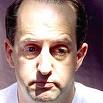The Wisdom of Jeff Van Gundy - Part III
He is at it again!
The great Jeff Van Gundy, former NBA head coach for the New York Knicks and the Houston Rockets and current TV analyst, who has been the subject of not one, but two posts here on the blog, gave us more sage wisdom to chew on during the telecast of Game 3 of the NBA Finals between the Boston Celtics and the Los Angeles Lakers this past Tuesday night.
current TV analyst, who has been the subject of not one, but two posts here on the blog, gave us more sage wisdom to chew on during the telecast of Game 3 of the NBA Finals between the Boston Celtics and the Los Angeles Lakers this past Tuesday night.
During a timeout the camera cut to a shot of the Lakers team huddle, and we saw the team's star and best player Kobe Bryant emphatically and forcefully giving instructions to several of his teammates. Bryant had the rapt attention of the other players, and while the audio did not pick up what he was actually saying, it was clear from facial expressions and body language that he was delivering a tough message. Perhaps a message that the other players were uncomfortable hearing.
Observing this activity in the huddle, JVG shared with us this gem:
You don't want your best player to be your best liked player.
Think about that one. When the best player is also the leader of the team, that often means having to get in the other player's faces, to make sure that the effort and passion is there, and also to simply instruct and coach. When the best player takes on those responsibilities, and stops worrying about being 'liked' all the time, chances are overall team performance will improve.
Being the 'best' carries with it another level of commitment not only to personal excellence, but to doing the kinds of things that can impact the performance of the other players on the team. In basketball that may mean sharp criticism, aggressive play in team practices (Michael Jordan was notorious for this), and putting in extra time in the weight room or doing additional running or sprints.
In the workplace the same kind of rules can apply. When the 'best' or most respected employee consistently sends the right message, displays a high level of integrity, actively supports and coaches the newer members of the team, and essentially models the kind of behaviors that indicate the expected 'way we do things', then the other members of the team, and the overall organization can improve, and can win.
It doesn't really work in the converse, a sports team can almost never be led by the last guy on the bench. He or she may understand the key leadership skills, but without that respect or standing that comes with actually excelling on the court or field then it is less likely the team will choose to follow.
In basketball, there are dozens of 'best' players, but there are only a precious few great players.
Inside organizations that same ratio probably applies. Every group has their best performer, but only a few make an impact on the team and the organization in the broader sense.
And you don't necessarily get there by being liked all the time.

 Steve
Steve


